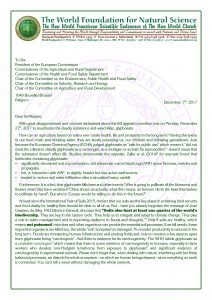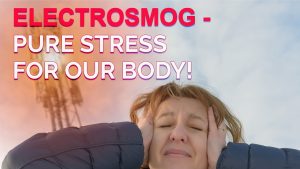MEPs doubted the credibility of some studies used in the EU evaluation on glyphosate safety. Especially the so-called “Monsanto Papers”, internal documents from the company which owns and produces Roundup, of which glyphosate is the main active substance[i] are not trustworthy. Furthermore, 1.3 million European citizens signed the “Stop Glyphosate Initiative”[ii] and demand “to ban glyphosate and protect people and the environment from toxic pesticides”.
On November, 27th, 2017, the European Commission gave a crushing response: The majority voted to nevertheless renew the approval of glyphosate for a period of 5 years and was reached by the Appeal Committee. This news caused The World Foundation for Natural Science to write an open letter to the European Commissioners and Committee Chairs whom we ask to reconsider this unwise vote.
Five years more to poison soils, animals, foods and our bodies?
This mustn’t be! We, the citizens of this planet, don’t need to wait for an official pesticide ban to ban them from our daily lives. There are over 2.4 million organic farmers worldwide and millions of consumers that already took this decision and got into action[iii]. So can you!
There are far too many toxins used in agriculture and private gardens. But are you aware that everything in nature is connected and when killing one weed or insect, this has an impact on the whole ecosystem – which we, human kind, of course is a part of?
By banning glyphosate the European Union would be a true example for other countries. Countries where people suffer obviously from the use of pesticides on the large-scale. Countries such as Argentina, where agrochemicals are causing a human tragedy with over 13,000,000 victims. The photographer Pablo E. Piovano travelled through Argentina for three years and his photos document the deadly consequences of the use of agrochemicals in a country where for the most part GM crops are cultivated: Two-thirds of the cultivable land is covered with soybeans. GM crops go together with pesticides. Glyphosate is the best example of this fact: It has the highest global production volume of all herbicides. Its agricultural use has increased sharply since the development of genetically modified crops[iv].
Who still doesn’t believe how dramatically glyphosate and other agrotoxins enda nger life – human lives, animals and natural life: Let Pablo E. Piovano’s photographs touch you[v].
nger life – human lives, animals and natural life: Let Pablo E. Piovano’s photographs touch you[v].
Since the politicians seem to have difficulties in standing for the protection of life, we, each one of us, must get active, change our way of consumption and only buy pesticide-free food, usually labelled as organic. We invite you to read our open letter for the EU commissioners and chairs. May it inspire you to write similar letters or talk to your local supermarkets, farmers and newspapers. It’s time for a change – it’s time for an agriculture not based on toxins and death, but based on love and cooperation with Mother Earth.
Fore more information:
- Fact Sheet about the disappearance of the bees.
- Fact Sheet about “The hidden use of Genetically Modified Organisms and their impact on Human Beings, Animals and Nature”.
[i] http://www.europarl.europa.eu/news/en/press-room/20171020IPR86572/meps-demand-glyphosate-phase-out-with-full-ban-by-end-2022
[ii] https://stopglyphosate.org/en/
[iii] The World of Organic Agriculture 2017, FiBL.org
[iv] http://www.iarc.fr/en/media-centre/iarcnews/pdf/MonographVolume112.pdf
[v] El Costo Humano de los Agrotóxicos / The Human Cost of Agrotoxins. Pablo E. Piovano. Kehrer Verlag Heidelberg Berlin, 2017; http://www.pablopiovano.com/multimedia.html









